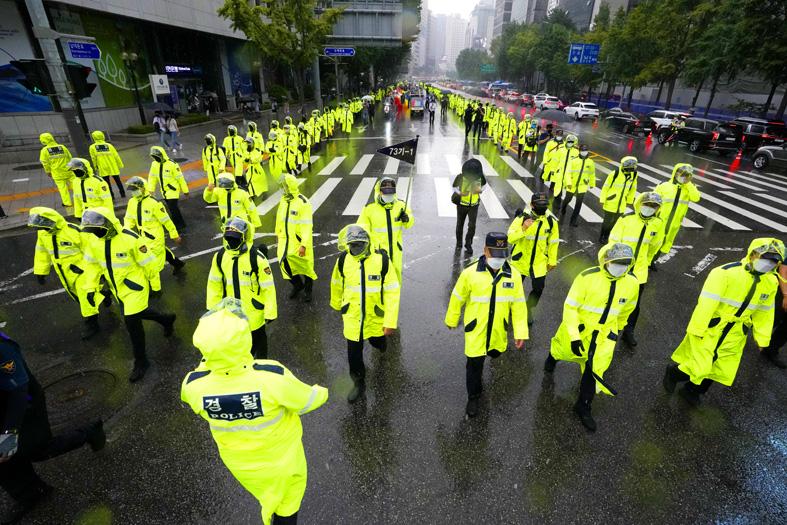Thousands of gay rights supporters yesterday celebrated under a heavy police guard in the South Korean capital as they marked the city’s first Pride parade in three years after a COVID-19 hiatus.
Police were on alert as church-backed counterdemonstrators rallied in nearby streets, highlighting the tensions surrounding the rights of sexual minorities in the deeply conservative country, but there were no significant scuffles or disruptions as of yesterday afternoon.
Revelers wearing or waving rainbow banners cheered during speeches and swayed to music from a stage in front of city hall at the Seoul Queer Parade, which promotes equality for lesbians, gays, bisexuals and transgender people.

Photo: AP
Police established perimeters to separate them from conservative Christian protesters, also numbering in the thousands, who held up banners and chanted slogans opposing homosexuality as their leader shouted prayers into a microphone pleading that God “save the Republic of Korea from anti-discrimination legislation.”
Some of those protesters denounced Seoul Mayor Oh Se-hoon over the city’s unwillingness to block the “lewd” Pride parade.
Gay rights advocates are also unhappy with Oh, who in an interview with a Christian newspaper last week said the city might prohibit the Pride event from using the city hall plaza starting next year if this year’s participants “exhibit indecent materials or overexpose their bodies.”
Thousands of police officers from nearly 60 units were deployed to watch the demonstrators from both sides, said Kim Man-seok, an official at the Seoul Metropolitan Police Agency.
Police did not immediately provide a crowd estimate, but had previously forecast a turnout of about 40,000 for the dueling events.
Participants in the Pride parade later planned to march toward Seoul’s main train station, about the same time that counterprotesters were planning to march in nearby streets.

ECONOMIC WORRIES: The ruling PAP faces voters amid concerns that the city-state faces the possibility of a recession and job losses amid Washington’s tariffs Singapore yesterday finalized contestants for its general election on Saturday next week, with the ruling People’s Action Party (PAP) fielding 32 new candidates in the biggest refresh of the party that has ruled the city-state since independence in 1965. The move follows a pledge by Singaporean Prime Minister Lawrence Wong (黃循財), who took office last year and assumed the PAP leadership, to “bring in new blood, new ideas and new energy” to steer the country of 6 million people. His latest shake-up beats that of predecessors Lee Hsien Loong (李顯龍) and Goh Chok Tong (吳作棟), who replaced 24 and 11 politicians respectively

Archeologists in Peru on Thursday said they found the 5,000-year-old remains of a noblewoman at the sacred city of Caral, revealing the important role played by women in the oldest center of civilization in the Americas. “What has been discovered corresponds to a woman who apparently had elevated status, an elite woman,” archeologist David Palomino said. The mummy was found in Aspero, a sacred site within the city of Caral that was a garbage dump for more than 30 years until becoming an archeological site in the 1990s. Palomino said the carefully preserved remains, dating to 3,000BC, contained skin, part of the

Russian hackers last year targeted a Dutch public facility in the first such an attack on the lowlands country’s infrastructure, its military intelligence services said on Monday. The Netherlands remained an “interesting target country” for Moscow due to its ongoing support for Ukraine, its Hague-based international organizations, high-tech industries and harbors such as Rotterdam, the Dutch Military Intelligence and Security Service (MIVD) said in its yearly report. Last year, the MIVD “saw a Russian hacker group carry out a cyberattack against the digital control system of a public facility in the Netherlands,” MIVD Director Vice Admiral Peter Reesink said in the 52-page

‘WATER WARFARE’: A Pakistani official called India’s suspension of a 65-year-old treaty on the sharing of waters from the Indus River ‘a cowardly, illegal move’ Pakistan yesterday canceled visas for Indian nationals, closed its airspace for all Indian-owned or operated airlines, and suspended all trade with India, including to and from any third country. The retaliatory measures follow India’s decision to suspend visas for Pakistani nationals in the aftermath of a deadly attack by shooters in Kashmir that killed 26 people, mostly tourists. The rare attack on civilians shocked and outraged India and prompted calls for action against their country’s archenemy, Pakistan. New Delhi did not publicly produce evidence connecting the attack to its neighbor, but said it had “cross-border” links to Pakistan. Pakistan denied any connection to